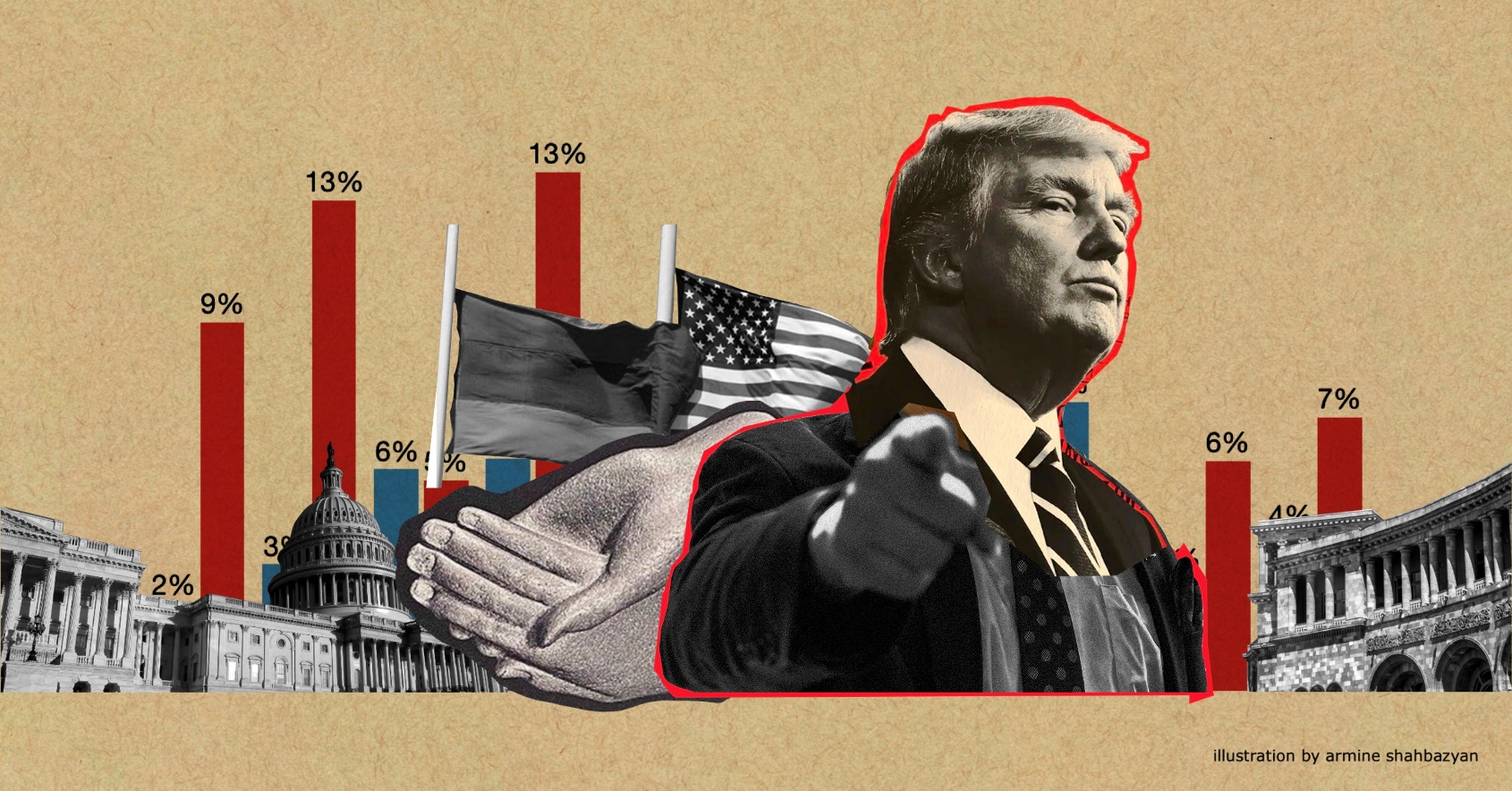
Listen to the article.
In its 2025 Annual Geopolitical Forecast, the American security analysis firm Stratfor suggested that “Armenia’s efforts to secure strong support from the United States will be thwarted as the Trump administration prioritizes strong relations with Baku as a regional counterbalance to Russian, Iranian and Chinese regional influence.” This is despite Baku’s increasingly closer ties with Russia and China, with which it has signed allied and strategic partnership agreements in 2022 and 2024, respectively. Moreover, Moscow and Tehran recently agreed on a pipeline via Azerbaijan for the import of Russian gas.
In his November Security Report for EVN Report, Dr. Nerses Kopalyan argued to the contrary, that the upcoming Trump administration “will very likely seek to prioritize the role of Armenia as a strategic partner” to counter the competing interests of China, Russia and Iran against the United States.
In a sign that the Trump presidency could see continuity rather than disengagement with Armenia, senior Republican Rep. Joe Wilson, chairman of the Helsinki Commission, stated in September that there is “clear bipartisan support” for increasing economic and political assistance to Armenia in order to “provide a bulwark against external threats.” While this sentiment perhaps reflects the position of Congress, it may not necessarily be pursued by the executive branch.
Under Biden, the two countries agreed to elevate their relationship to a strategic partnership. The charter was signed on January 14, just a week before Trump’s inauguration and was reportedly coordinated with the Trump team.
Trump’s Engagement With Armenia
Shortly before the November 5 election, Trump, in a social media post, accused Vice President Kamala Harris, the Democratic nominee, of doing “nothing as 120,000 Armenian Christians were horrifically persecuted and forcibly displaced in Artsakh” in September 2023. He vowed to “protect persecuted Christians” and “to stop the violence and ethnic cleansing” and to “restore peace between Armenia and Azerbaijan.” While his administration’s response to the 2020 war was largely marked by disengagement, much has changed since then. Yerevan has distanced itself from Moscow and now enjoys its warmest relations with the West since gaining independence.
Before the election, Trump also spoke on the phone with the Lebanon-based Catholicos Aram I of Cilicia, one of the two leaders of the Armenian Church, on November 1.
Since his election, Trump has engaged with Armenian Prime Minister Nikol Pashinyan, first in a phone call on November 16, which Pashinyan described as “very positive.” Pashinyan met Trump in person on December 7 during the reopening of the Notre-Dame Cathedral in Paris, where he was also photographed with key Trump ally Elon Musk. Pashinyan is set to visit Washington next month to attend the National Prayer Breakfast on February 6, where he may have an opportunity to engage with Trump further.
Aliyev Upbeat on Trump
Despite Trump’s apparently pro-Armenian posturing, Aliyev has made his preference for Trump (over Biden and Harris) very much explicit. In July 2024, he said that under Republican administrations, Azerbaijan’s ties with the U.S. “have always been much more productive, fruitful, and result-oriented.” He specifically praised the first Trump presidency, during which Baku and Washington “enjoyed very fruitful cooperation based on mutual respect and appreciation of each other’s support on different tracks.” In contrast, Aliyev expressed “deep disappointment” with the Biden administration, calling its approach to the South Caucasus “one-sided.”
When he spoke on the phone with Trump in late November, Aliyev told the president-elect that he “paid special attention to strengthening friendship and cooperation” between the two countries in his first term. In a recent interview, Aliyev warned Armenia’s leadership that “the Soros era has ended in America,” referring to the Biden presidency. He suggested that Trump’s first term was “very positive” for bilateral ties as the two countries “were able to make progress in many areas.” He said Baku’s “hopes are high” for the possibility of elevating U.S.-Azerbaijan ties to a strategic level during Trump’s second term. But Baku has suspended cooperation with USAID, suggesting an institutional disengagement with the U.S.
Trump Allies on Armenia
A possible influence on Trump’s policies regarding Armenia may be his cabinet appointees and nominees and other allies, who have addressed Armenia in various capacities. Ultimately, Trump’s approach to the region remains unpredictable and may be guided by personal connections, business interests, and the war in Ukraine. His decisions are likely to reflect a mix of pragmatic considerations and his administration’s broader foreign policy priorities, leaving the future of relations uncertain.
JD Vance
JD Vance, Trump’s Vice President, shared Trump’s post on Nagorno-Karabakh and likewise framed the ethnic cleansing of Artsakh Armenians as part of persecution of Christians, appealing to their evangelical base.
As a Senator from Ohio, he highlighted “the rapid overthrow of the ceasefire agreement in Nagorno-Karabakh by Azerbaijan and the exodus of an ancient Christian community” in a memo to Congressional leaders, noting it “may mark only the first political settlement to collapse in the shadow of the Russia-Ukraine War.” In a letter to the Secretary of the Treasury, he opposed the proposed sale of U.S. arms and ammunition manufacturer Remington Arms to Czechoslovak Group, citing implication in “violations of the arms embargo to Azerbaijan.”
Marco Rubio
Marco Rubio, Trump’s Secretary of State, has been quite outspoken on Armenian issues. A Republican Senator from Florida, he repeatedly supported formal recognition of the Armenian Genocide. In March 2015, he joined a bipartisan group of Senators in calling President Obama to do so prior to the centennial. In October 2019, he cosponsored the resolution to recognize the Armenian Genocide, which both houses did. In March 2021, he called on President Biden to follow suit, which he did in his April 24 statement.
Rubio, along with three other Republican Senators, issued a statement during the 2020 war in Nagorno-Karabakh, calling the escalation “extremely worrying” and called for “peaceful negotiations.” After Russia invaded Ukraine, Rubio tweeted: “Want to know where Putin strikes next? Then understand how he defines the ‘Greater Russia’ he believes is his destiny to restore. First Belarus. Then Ukraine. After that Armenia & Moldova.”
On September 13, 2022, when Azerbaijan launched a large-scale attack on Armenia, Rubio called the strikes on Armenian villages “an unjustified escalation by Azerbaijan,” adding that “it is past due for the U.S. to uphold the law and stop security assistance to Azerbaijan.”
On September 20, 2023, as Azerbaijan took over what was left of Nagorno-Karabakh (Artsakh), resulting in the forced displacement of its entire Armenian population, Rubio and California Democratic Senator Alex Padilla issued a joint statement. It condemned Azerbaijan’s “unprovoked attack against Armenian civilians in Nagorno-Karabakh—a grave escalation in the steps the regime has taken to ethnically cleanse Armenians in the region.” It called on the Biden administration and U.S. allies to “forcefully condemn” it and “demand a peaceful resolution,” adding that the U.S. should “immediately halt all security assistance to Azerbaijan.”
Weeks later, Rubio joined a bipartisan group of Senators in another statement on Nagorno-Karabakh announcing the introduction of legislation that would prevent the U.S. from providing security assistance to Azerbaijan until it has been determined that they are not taking offensive action against the Armenians. Rubio said: “It’s absurd that our nation has provided security assistance to Azerbaijan for decades, despite existing law requiring the President to certify that Azerbaijan is not taking offensive action against Armenians.”
The Armenian Protection Act passed the Senate by unanimous consent on November 15, 2023. Rubio called it a “crucial step in holding the Aliyev regime accountable and, if enacted, will ensure that U.S. security assistance is not used to further such aggression.” It has been introduced to the House.
Kopalyan suggests that Rubio’s sympathy toward Armenian interests and his hawkish views on China, Russia and Iran, his consideration of Armenia’s importance to American interests in the region “will allow for Armenia to be situated within the set of priorities driving the Trump Doctrine.”
Michael Waltz
Michael Waltz, a Republican Congressman from Florida whom Trump has appointed as his National Security Advisor (NSA), a key position with significant influence on foreign policy, has made a single statement on Armenia on social media. In late October 2020, he welcomed the U.S.-mediated ceasefire, which did not hold.
Tulsi Gabbard
Tulsi Gabbard, whom Trump has picked as Director of National Intelligence (DNI), has likewise been vocal on Armenian issues. A former Democratic Congresswoman from Hawaii, Gabbard ran in the 2020 Democratic primaries and endorsed Biden after withdrawing and grew increasingly conservative in recent years. If confirmed as DNI director, she will be in charge of overseeing 18 intelligence agencies, including the CIA.
Gabbard was a member of the Congressional Caucus on Armenian Issues. As a Congresswoman, she visited Armenia in September 2017 with colleagues. In Yerevan, they met with President Serzh Sargsyan, Prime Minister Karen Karapetyan, Defense Minister Vigen Sargsyan, and Catholicos Karekin II. The goal was to strengthen U.S.-Armenian economic, humanitarian, and security ties. She also visited Nagorno-Karabakh (Artsakh), for which she was blacklisted by Azerbaijan. In Stepanakert, the Congressional delegation met with parliament members.
Gabbard also spoke out against the 2020 war in Nagorno-Karabakh. She stated that Washington must urge Azerbaijan to immediately end their attacks and Turkey to “cease its involvement both directly through the use of its armed forces and indirectly by sending Al-Qaeda associated proxies to wipe out Nagorno-Karabakh’s Armenian population.” She recalled her visit to Nagorno-Karabakh, where she “heard firsthand of their commitment to upholding the ceasefire and working with international parties to achieve a lasting peace agreement.”
A resolution co-sponsored by Gabbard was introduced to the House of Representatives on October 1 condemning Azerbaijan’s “continued aggressive military operations” in Nagorno-Karabakh, and denounced Turkey’s “reported participation in and escalation of the conflict” under President Erdogan. It did not receive a vote.
She also joined fellow Democrats in the Senate and House in urging Secretary of State Pompeo to immediately suspend U.S. security assistance to Azerbaijan and convince Turkey to immediately disengage from the conflict.
Robert Kennedy Jr.
Robert Kennedy Jr., a former Democrat and nephew of President John F. Kennedy is set to become Secretary of Health, not a position that is expected to have any influence on foreign policy. Nevertheless, he has been similarly vocal on Armenia in recent times. In December 2023, he stated that the U.S. “needs to mobilize regional support for Armenians’ right to self-defense and self-determination and advocate for the safe return of Artsakh Armenians to their historic homeland.” On Genocide Rememberance Day, he called for recommitting to “end the ethnic cleansing and defend Armenians’ right to self-determination.”
Massad Boulos
Another key person in Trump’s inner circle who may influence the administration’s policy on Armenia is Massad Boulos, a Christian Lebanese businessman and the father-in-law of Trump’s daughter Tiffany, whom Trump has picked as his senior advisor on Arab and Middle Eastern Affairs. He apparently played a role in Trump’s phone calls with Catholicos Aram I of Cilicia on November 1 and Prime Minister Pashinyan on November 16.
Also see
Armenia and the U.S. Sign Strategic Partnership
Armenia and the U.S. have signed a Strategic Partnership Commission charter, committing to deepen security ties, economic cooperation, and democratic reforms. This milestone signals a more diversified foreign policy, emphasizing sovereignty, regional security and collaboration with Washington amid evolving geopolitical dynamics.
Read moreRevisiting the U.S. Response to the 2020 Artsakh War
The Trump administration’s response to the 2020 war reflected a blend of traditional U.S. neutrality as a mediator and Trump's characteristic populist rhetoric, which appeared partly aimed at appealing to Armenian-American voters during the U.S. presidential election campaign that year.
Read moreEVN Security Report
EVN Security Report: November 2024
Looking at the emerging contours of the Trump Doctrine and its implications for the South Caucasus, Nerses Kopalyan examines competing policy orientations within Trump's incoming administration and how these will shape U.S. engagement with Armenia amid broader global and geopolitical priorities.
Read morePodcast
A New Chapter in US-Armenia Relations: The Strategic Partnership Charter
On January 14, Foreign Minister Ararat Mirzoyan and Secretary of State Antony Blinken signed the U.S.-Armenia Strategic Partnership Commission charter, a milestone in relations between the two nations. The agreement opens new pathways for deepening engagement in economic development, energy, security, democracy, justice, and people-to-people exchanges. Nerses Kopalyan provides contextual analysis and explains its strategic implications for Armenia.
Read more[Beyond Borders]
Column









